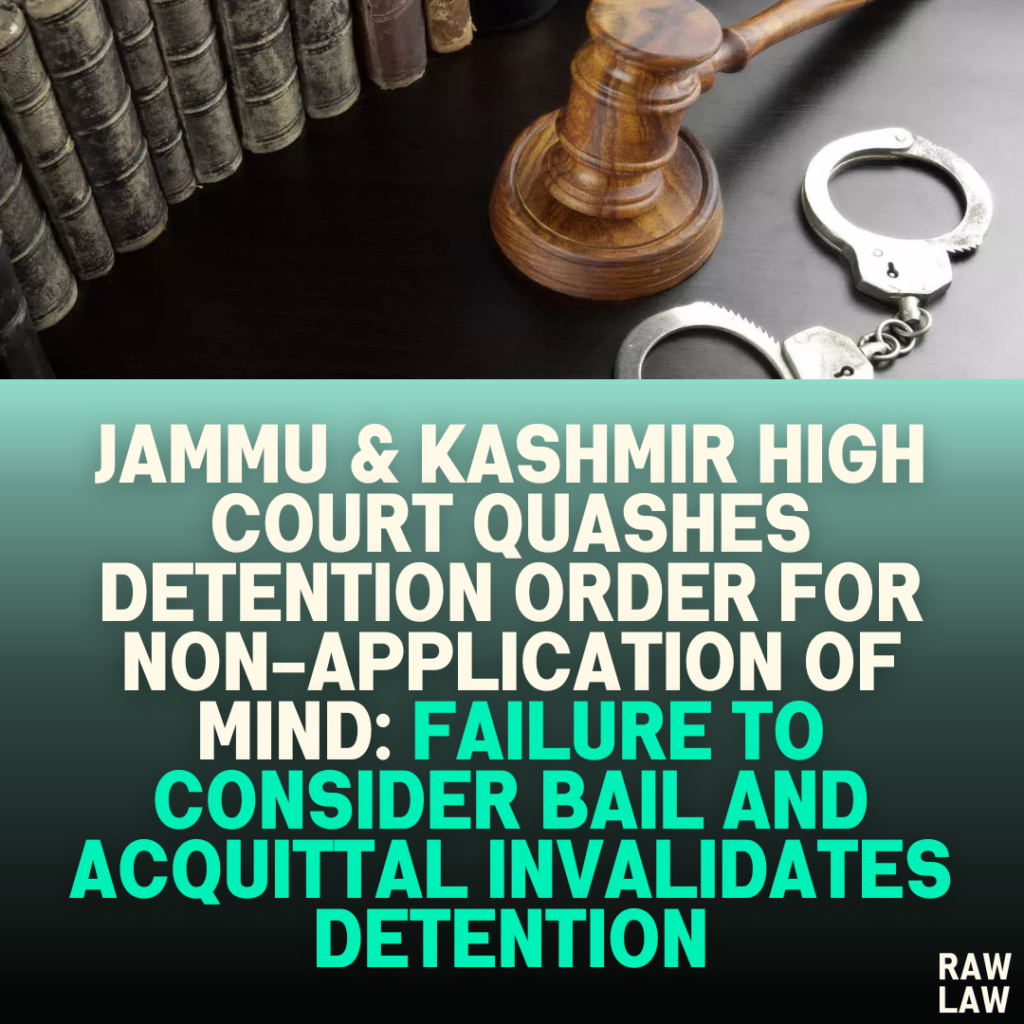Court’s Decision: The Jammu & Kashmir High Court quashed the detention order No. PSA 28 of 2023 issued against the petitioner by the District Magistrate, Jammu. The court held that the order was invalid due to non-application of mind by the Detaining Authority, particularly the failure to consider the fact that the petitioner had been granted bail in all relevant FIRs and was acquitted in some complaints. The court directed the immediate release of the petitioner unless he was required in any other case.
Facts: The petitioner had been detained under the Jammu & Kashmir Public Safety Act (PSA) pursuant to an order dated 15.11.2023, which was based on multiple FIRs and complaints filed against him between 2011 and 2023. The grounds for detention included FIRs related to trespassing on government land, damaging government property, issuing threats, and assault. The petitioner challenged this detention order on the basis that it was a mere repetition of an earlier detention order from 2016, and that the grounds used for detention had already been dealt with in the court, with the petitioner being granted bail.
Issues: The primary issue was whether the detention order was valid in light of the fact that the petitioner had been granted bail and acquitted in several of the cases cited by the Detaining Authority.
Petitioner’s Arguments: The petitioner argued that the detention order was passed without application of mind, as the same grounds had been used in a previous detention order, and the petitioner had already been granted bail in all relevant FIRs. Furthermore, the petitioner contended that critical materials and information, such as the bail orders, had not been supplied to him, thus infringing on his right to make an effective representation.
Respondent’s Arguments: The respondents argued that the petitioner posed a threat to public order and stability due to his involvement in various criminal activities, and his detention was necessary to prevent him from continuing such activities. They contended that all statutory requirements had been fulfilled in issuing the detention order.
Analysis of the Law: The court examined whether the Detaining Authority had acted in accordance with the law in issuing the detention order. The court observed that when a person is already on bail, it is imperative for the Detaining Authority to take note of the bail orders and assess whether the person poses a continuing threat to public order.
Precedent Analysis: The court referred to the Supreme Court ruling in Rishikesh Tanaji Bhoite vs. State of Maharashtra (2012) 2 SCC 72, where it was held that if a detenu is on bail, the bail order must be considered by the Detaining Authority. Failure to do so vitiates the detention order.
Court’s Reasoning: The court reasoned that the Detaining Authority had failed to consider key facts such as the petitioner’s bail and acquittal in some of the complaints. The failure to consider these facts demonstrated non-application of mind, thereby invalidating the detention order. The court highlighted that the detaining authority’s subjective satisfaction was compromised due to the omission of such vital information.
Conclusion: The court quashed the detention order, holding that it was rendered unsustainable due to the non-application of mind by the Detaining Authority. The court ordered the immediate release of the petitioner unless he was required in connection with any other case.
Implications: The judgment reinforces the principle that detention orders must be passed with due consideration of all relevant facts, including bail and acquittal. Authorities must ensure that all material facts are taken into account when issuing detention orders under preventive laws like the PSA. Failure to do so will render such orders invalid, as seen in this case.




Pingback: Karnataka High Court Dismisses 2013 Criminal Revision Petition in Matrimonial Dispute for Non-Prosecution Due to Absence of Petitioner and Counsel, Citing Case Pendency - Raw Law
Pingback: Bombay High Court Dismisses Appeal, Denies Interim Injunction in Copyright Dispute Over Competitive Exam Study Material, Questions Copyright Protection for Public Domain Content - Raw Law